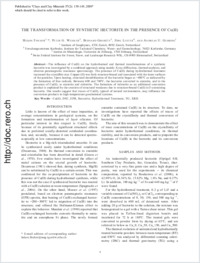The transformation of synthetic hectorite in the presence of Cu(II)
- Fischer, Håkon Institute of Geophysics,ETHZurich, Switzerland
- Weidler, Peter G. Forschungszentrum Karlsruhe, Institute for Technical Chemistry, Water and Geotechnology, Germany
- Grobéty, Bernard InstitutdeMinéralogie,Université deFribourg, Switzerland
- Luster, Jörg Swiss Federal Institute for Forest, Snow, and Landscape Research, Birmensdorf, Switzerland
- Gehring, Andreas U. Institute of Geophysics,ETHZurich, Switzerland
-
2009
Published in:
- Clays and Clay Minerals. - 2009, vol. 57, no. 2, p. 139-149
English
The influence of Cu(II) on the hydrothermal and thermal transformations of a synthetic hectorite was investigated by a combined approach using mainly X-ray diffraction, thermal analyses, and electron paramagnetic resonance spectroscopy. The presence of Cu(II) during hydrothermal treatment increased the crystallite size. Copper (II) was both structure-bound and associated with the inner surfaces of the particles. Upon heating, structural destabilization of the hectorite began at ∼400°C as indicated by the formation of free radicals. Between 600 and 700°C, the hectorite converted to enstatite, and in the presence of Cu(II), to enstatite and richterite. The formation of richterite as an additional conversion product is explained by the creation of structural weakness due to structure-bound Cu(II) in F-containing hectorite. Our results suggest that traces of Cu(II), typical of natural environments, may influence the conversion products in high-temperature geochemical systems.
- Faculty
- Faculté des sciences et de médecine
- Department
- Département de Géosciences
- Language
-
- English
- Classification
- Mineralogy
- License
- License undefined
- Identifiers
-
- RERO DOC 13178
- DOI 10.1346/CCMN.2009.0570201
- Persistent URL
- https://folia.unifr.ch/unifr/documents/301299
Statistics
Document views: 106
File downloads:
- grobety_tsh.pdf: 150
